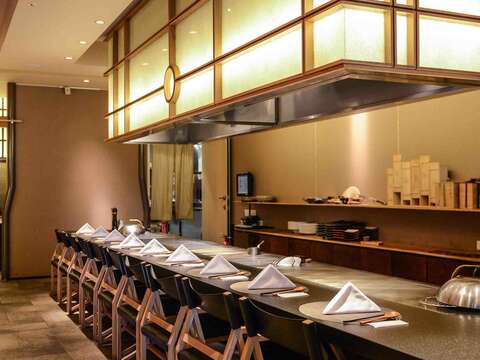Post date:2016-07-11
Updates:2016-08-23
1867
Article _ Chiang Hsinying
Photos _ Li Kaiming
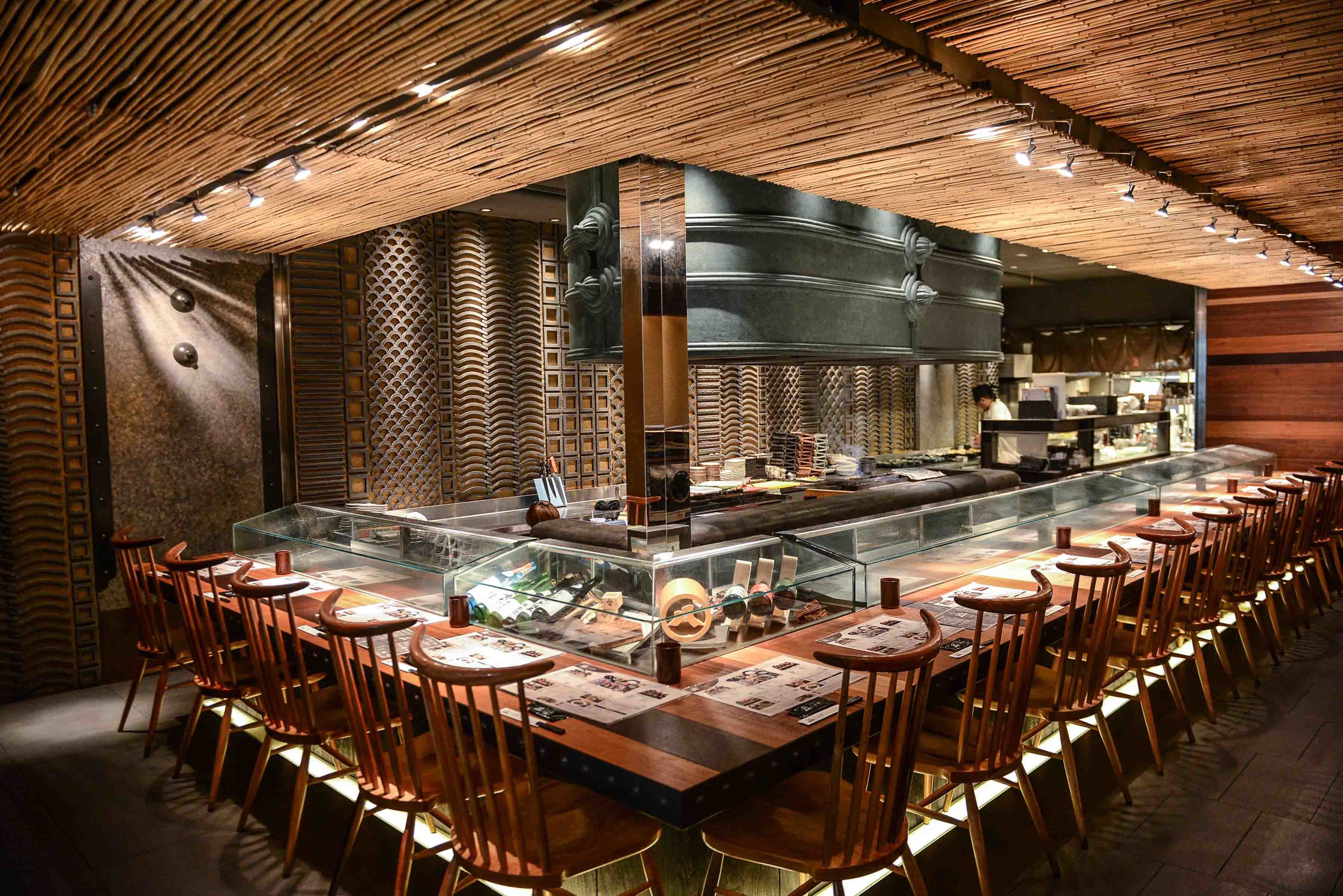
1. Hachibei’s yakitori possesses the authentic flavors of Fukuoka’s Hakata area. Specially selected Taiwan native Guiding range chicken and pork from Yilan black pigs are used. Thus, only in Taiwan can such delicious yakitori be enjoyed. A full range of red wines, sakes, and beers is available, making it well suited for gatherings of friends.
In the early ’90s, Japan was in the late stage of its bubble economy. Everything appeared to be flourishing, and ideals and dreams seemed only a step away. After finishing up for the day, colleagues would gather at their local yakiniku restaurant ( Japanese-style bar and grill). The senior members of the group harbored great ambition, and would indulge in loud and empty talk. The junior members of the group would raise their glasses in agreement, and would engage in uninhibited drinking. Mellowed by the alcohol, they would take turns encouraging each other to drink more, with toasts of “Drink! Drink! Drink!” Without regard for age, gender, or position, this was a competition of eating, drinking, and daring. Amidst the noise and excitement of a yakinikurestaurant in the Shibuya area of Tokyo, with its festive eating and drinking atmosphere, Soji Hiraide, CEO of the Kanpai Group (乾杯集團), got his start.
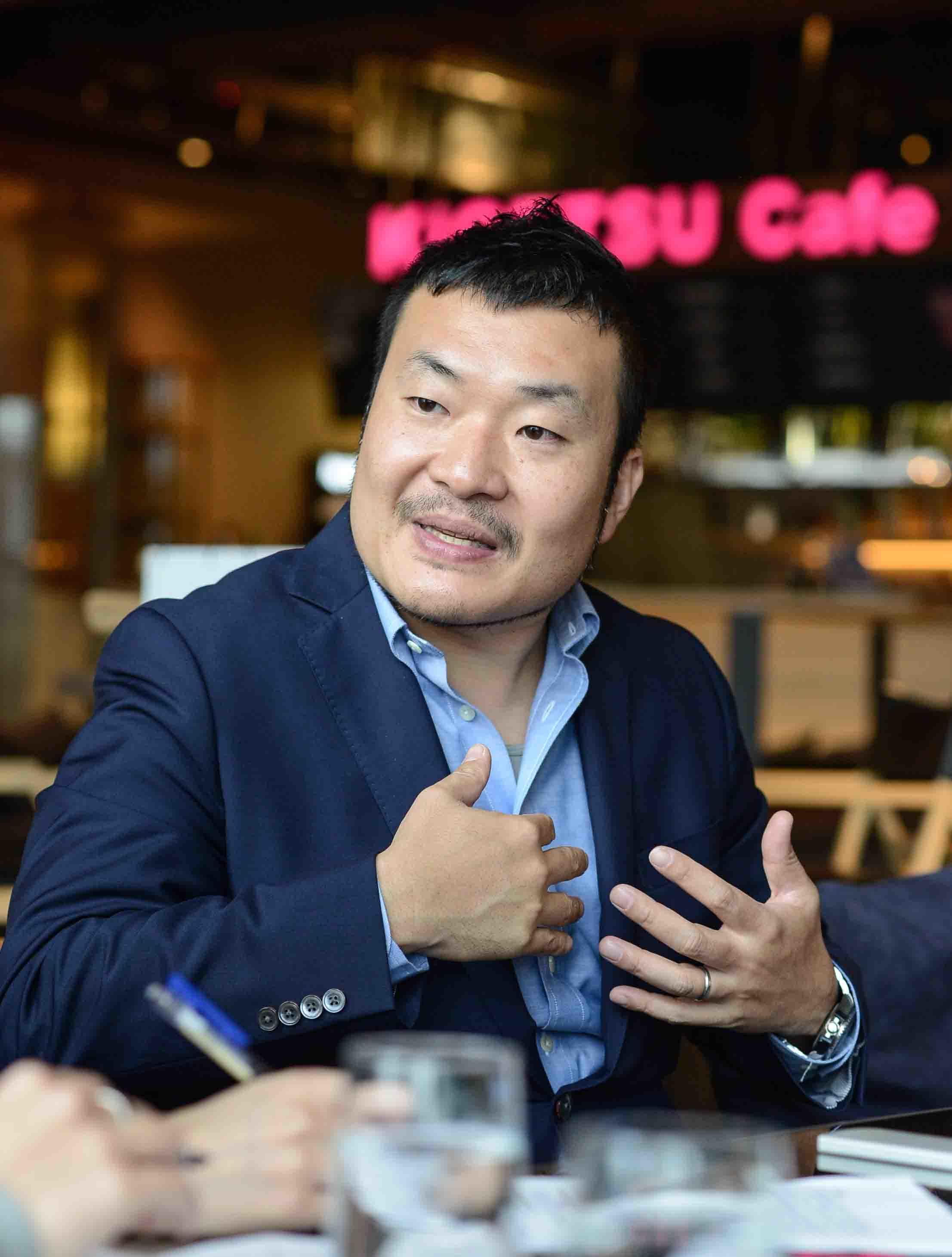
2. Soji Hiraide expresses great enthusiasm regarding his F&B industry career. Born to a Taiwanese mother and Japanese father, his Taiwanese side gives him boldness of personality, while his Japanese gives him a careful and meticulous nature.
Opportunity or Fate? Unexpected Entrance into a Yakiniku Career
Mention three key terms – grilled meat, beer, and pork-belly slices – and almost all Taipei residents between the ages of 20 and 40 will immediately think of Kanpai Yakinuki Restaurant (乾杯居酒屋). Whether a birthday celebration, get-together, or farewell party, any occasion celebrated at this place of spirited conversation and lively exchanges is sure to be a source of fond memories. The Kanpai Group has decidedly changed Taiwan’s Japanese- style bar and grill culture, to the point that in the minds of Taipei residents it has become synonymous with the Kanpai brand.
Hiraide grew up in Japan. Born to a Taiwanese mother, food was his first connection with Taiwan. He often had the opportunity to spend time with relatives visiting from Taiwan, and food and hospitality shaped his impression of this island. He says that, “I looked a lot like them, but could not speak their language. I felt that was a pity.” This led to his decision to move to Taipei to study Chinese after graduating from high school. In his second year after coming to Taiwan, on a sightseeing visit his mother brought a friend who ran a yakiniku restaurant, and the friend decided to open a branch in Taipei. Hiraide returned to Japan for half a year to undergo training in management and operations, then worked in the restaurant for a year, until applying for admission to Fu Jen Catholic University (輔仁大學). With a laugh, he explains that, “I never thought that I would enter the food and beverage industry. I kept thinking that after graduating from university I would return to Japan and become a regular office worker.” Although not part of his plan, in his junior year of college, before getting the chance to graduate, he took over a floundering yakiniku restaurant in Taipei’s East District. Along with a partner from college days, he created the lively, unique Kanpai, and welcomed the start of his challenge-filled yakiniku life.
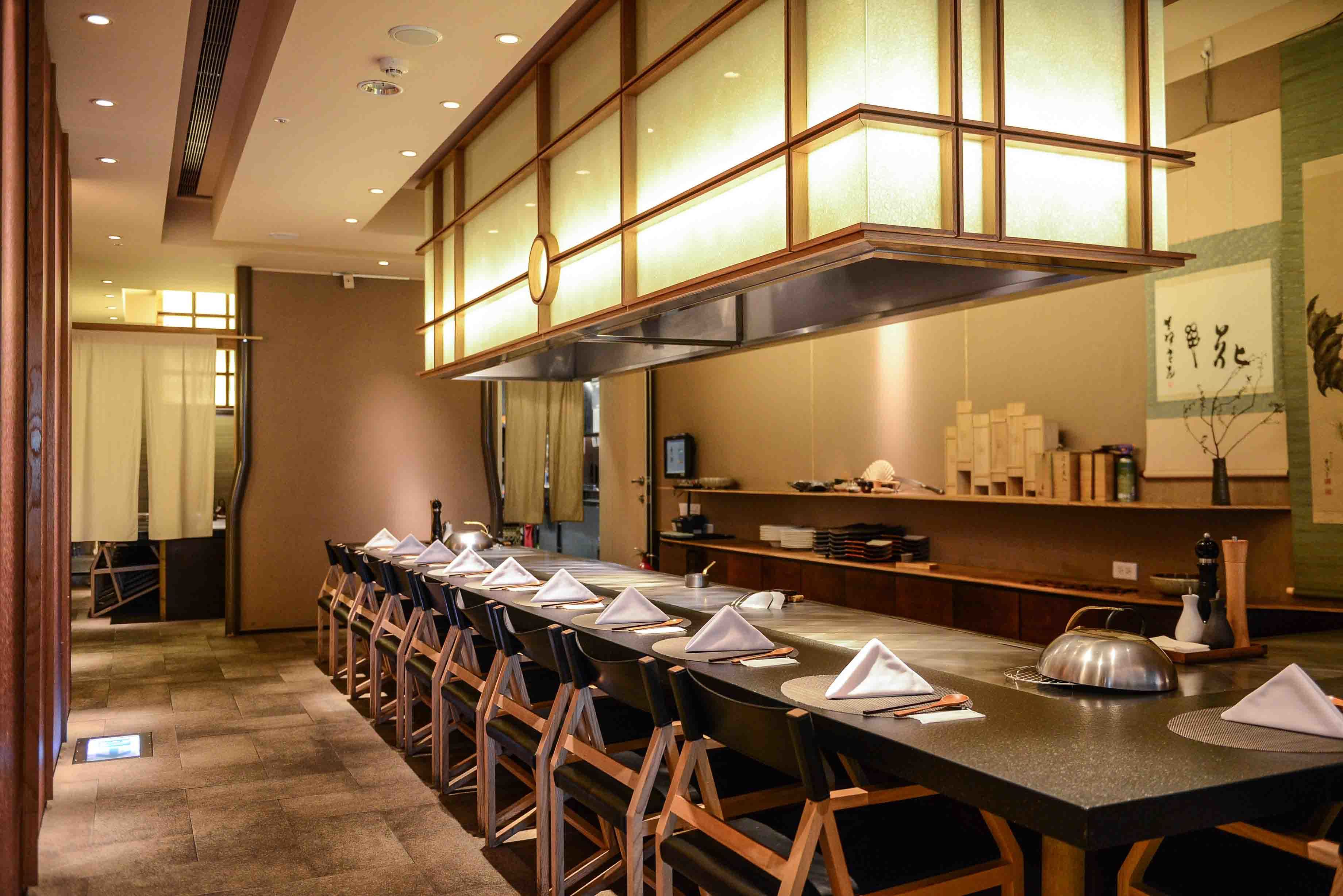
3. Teppanyaki Kigetsu integrates Australian Wagyu beef with fresh, seasonal ingredients. The menu is changed every three months. This restaurant simultaneously adheres to kaiseki cuisine and teppanyaki concepts.
Eating It All Up – Diverse Food and Drink Culture
In his view, Taipei is a very open and inclusive place. “The people of Taipei are accepting of foreign cuisines,” he states. “They eat everything. This is an important part of the culture.” Instead of talking about yakiniku, he gives hotpot as an example. From the ’80s into the ’90s, within the short span of a decade hotpot became mainstream in the food and beverage market. From Taiwan’s traditional ginger duck cooked with rice wine, to chicken stewed in rice wine, northeastern sour-cabbage hotpot, nourishing Mongolian hotpot, southern Sichuan spicy hotpot, Japanese shabu shabu, and the recently popular Korean-style army hotpot, myriad types of hotpot dishes have arrived in Taiwan and become widely popular after having been fused with local characteristics. This fully reflects the “inclusivity” of Taipei’s people.
The drinking cultures of Taiwan and Japan differ. Hiraide laughingly says that, “In Taiwan, it seems that eating and drinking are separated into two different things. If it is clear that a meal will involve drinking, there will be a little bit of nervousness that the drinking will be heavy.” In Chinese, ganbei means to drain your glass in one gulp, as a sign of sincerity and boldness. The Japanese term kanpai (which uses the same two characters as the Chinese “ganbei”) means “to celebrate” and “first drink up to show respect,” which differs from the Chinese connotation. For Hiraide, eating and drinking are relaxing and joyful experiences. Both should be done slowly, while enjoying exchanges among people. He says that, “Happily eating, while at the same time drinking and chatting” is the food and drink philosophy that he most wants to share with the people of Taipei.
When asked about his impression of Taiwan’s cuisine as a child, without hesitation Hiraide replies, “Beef noodles, really delicious!” There is not a long history of beef consumption in Taiwan. Following the mechanization of agriculture, beef dishes started to become popular, dating back not more than 60 or 70 years. Beef noodles is a classic dish relished by many foreigners. In Taipei, at the height of beef noodles popularity, there was even a “beef noodles street” (牛肉麵街) along Zhengzhou Road (鄭州路). In addition, the Taipei City Government has staged the well-received Taipei International Beef Noodle Festival for many years. Nevertheless, due to the influences of geography, natural conditions, and social customs, very few cattle are raised domestically. Selection of imported meat products are a common challenge faced by both consumers and restaurant owners.
Hiraide is well aware of the high demand in the beef market. On the one hand, this has led to the development of good relations with the Australian animal-husbandry industry, and to the introduction of outstanding-quality Australian Wagyu beef at reasonable prices. On the other hand, as representative of a well-known Japanese restaurant brand, he understands that fromyakiniku to teppanyaki to yakitori and hotpot, different parts of a beef cow are used. He would like more people to understand the allure of beef dishes, and also hopes that in the future better meat-product choices can be provided to members of his industry. “Those who sell food have a great responsibility to society, for peace of mind about what is being consumed, for safety and for good taste,” he says. “Customers should feel better after eating a meal, and have the motivation to keep going tomorrow – that is our responsibility.” Hiraide does not only want to introduce beef and technique to Taiwan, but also to promote Taiwan’s special features, such as its extremely delicious pork and chicken. Therefore, at Ippudo
TW (一風堂) and Hachibei (八兵衛), for which the Kanpai Group serves as agent, Taiwan pork and same-day slaughtered chicken are on offer to create flavors exclusive to Taiwan.
In this age of “Taipei-Tokyo in one day” convenience, he would like Taipei to become the preferred eating destination for Japanese foodies.
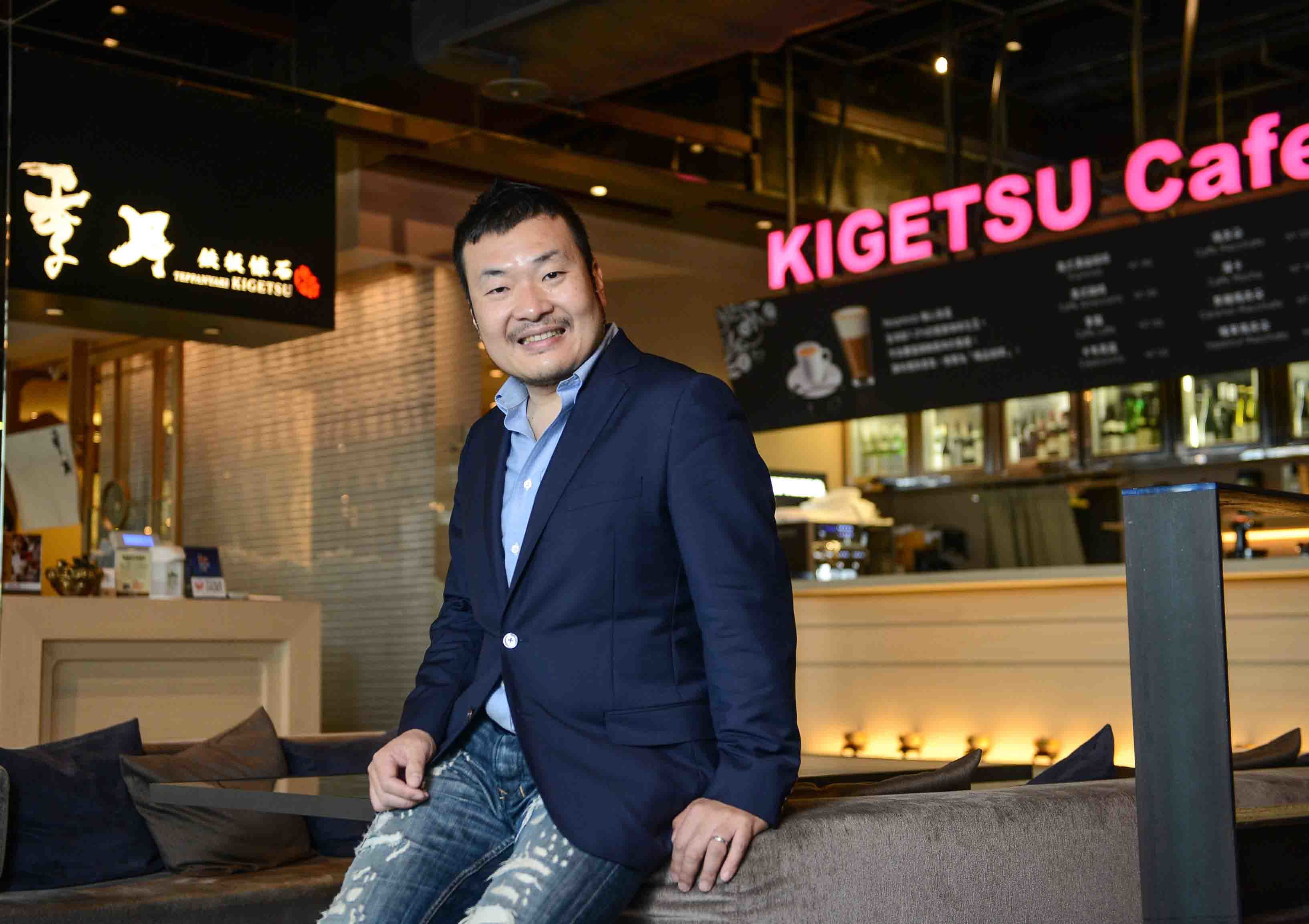
4. After a meal at Teppanyaki Kigetsu (季月鐵板懷石料理; left), dessert is not served at the teppanyaki table.
Instead, it is served at the Kigetsu Cafe (季月咖啡; right), where it can be slowly savored while sitting on a comfortable sofa. This is part of Soji Hiraide’s slow-food philosophy. In addition to dessert, the Kigetsu Café also serves afternoon tea.
Zest of Life Experienced in Food and Drink
“The year began with lunch.” This is the opening line in A Year in Provence by Peter Mayle. More often than not, food and drink carry a connection with life. During the interlocking of glasses, we experience and come to understand the philosophy of life, accumulating a sense of taste and a zest for life. From the youthful, festive Kanpai Yakiniku Restaurant to the sharing of life’s joys and sorrows among a more middle aged crowd at Kanpai Classic (老乾杯), and from the elegant KP Steak Bistro (KP牛排小酒館) to the membership-based Kanpai Sake School (乾杯SAKE學苑), Hiraide’s enterprise embodies the different stages of life. He says that when he was in college he would ride his scooter in explorations of greater Taipei, and when he was upset he would go to soak in the hotspring waters on Yangmingshan. After getting married, he would often ride his bicycle to experience slow travel in the city and meticulously observe its gradual changes. Now, he pushes a stroller on walks around the National Dr. Sun Yat-sen Memorial Hall (國立國父紀念館). These are his happiest moments. Enjoying a slow pace of life and as always passionate about his work, he has now set out from Taipei to take the Kanpai Group into international markets. Its first overseas branch is in Shanghai. This son-in-law of Taiwan takes great pride in classifying himself as an overseas Taiwanese businessman who is working to bring the taste of Japan via Taiwan to the world. After living in Taipei for more than 20 years, where he has pursued studies, established a business, and started a family, Hiraide’s precious youth has been spent on this island. Due to countless chances of fate that have deepened Hiraide’s blood bonds with the island, Taipei is no longer a distant far-off place.
Excessive alcohol consumption may be harmful to your health.
Photos _ Li Kaiming

1. Hachibei’s yakitori possesses the authentic flavors of Fukuoka’s Hakata area. Specially selected Taiwan native Guiding range chicken and pork from Yilan black pigs are used. Thus, only in Taiwan can such delicious yakitori be enjoyed. A full range of red wines, sakes, and beers is available, making it well suited for gatherings of friends.
In the early ’90s, Japan was in the late stage of its bubble economy. Everything appeared to be flourishing, and ideals and dreams seemed only a step away. After finishing up for the day, colleagues would gather at their local yakiniku restaurant ( Japanese-style bar and grill). The senior members of the group harbored great ambition, and would indulge in loud and empty talk. The junior members of the group would raise their glasses in agreement, and would engage in uninhibited drinking. Mellowed by the alcohol, they would take turns encouraging each other to drink more, with toasts of “Drink! Drink! Drink!” Without regard for age, gender, or position, this was a competition of eating, drinking, and daring. Amidst the noise and excitement of a yakinikurestaurant in the Shibuya area of Tokyo, with its festive eating and drinking atmosphere, Soji Hiraide, CEO of the Kanpai Group (乾杯集團), got his start.

2. Soji Hiraide expresses great enthusiasm regarding his F&B industry career. Born to a Taiwanese mother and Japanese father, his Taiwanese side gives him boldness of personality, while his Japanese gives him a careful and meticulous nature.
Opportunity or Fate? Unexpected Entrance into a Yakiniku Career
Mention three key terms – grilled meat, beer, and pork-belly slices – and almost all Taipei residents between the ages of 20 and 40 will immediately think of Kanpai Yakinuki Restaurant (乾杯居酒屋). Whether a birthday celebration, get-together, or farewell party, any occasion celebrated at this place of spirited conversation and lively exchanges is sure to be a source of fond memories. The Kanpai Group has decidedly changed Taiwan’s Japanese- style bar and grill culture, to the point that in the minds of Taipei residents it has become synonymous with the Kanpai brand.
Hiraide grew up in Japan. Born to a Taiwanese mother, food was his first connection with Taiwan. He often had the opportunity to spend time with relatives visiting from Taiwan, and food and hospitality shaped his impression of this island. He says that, “I looked a lot like them, but could not speak their language. I felt that was a pity.” This led to his decision to move to Taipei to study Chinese after graduating from high school. In his second year after coming to Taiwan, on a sightseeing visit his mother brought a friend who ran a yakiniku restaurant, and the friend decided to open a branch in Taipei. Hiraide returned to Japan for half a year to undergo training in management and operations, then worked in the restaurant for a year, until applying for admission to Fu Jen Catholic University (輔仁大學). With a laugh, he explains that, “I never thought that I would enter the food and beverage industry. I kept thinking that after graduating from university I would return to Japan and become a regular office worker.” Although not part of his plan, in his junior year of college, before getting the chance to graduate, he took over a floundering yakiniku restaurant in Taipei’s East District. Along with a partner from college days, he created the lively, unique Kanpai, and welcomed the start of his challenge-filled yakiniku life.

3. Teppanyaki Kigetsu integrates Australian Wagyu beef with fresh, seasonal ingredients. The menu is changed every three months. This restaurant simultaneously adheres to kaiseki cuisine and teppanyaki concepts.
Eating It All Up – Diverse Food and Drink Culture
In his view, Taipei is a very open and inclusive place. “The people of Taipei are accepting of foreign cuisines,” he states. “They eat everything. This is an important part of the culture.” Instead of talking about yakiniku, he gives hotpot as an example. From the ’80s into the ’90s, within the short span of a decade hotpot became mainstream in the food and beverage market. From Taiwan’s traditional ginger duck cooked with rice wine, to chicken stewed in rice wine, northeastern sour-cabbage hotpot, nourishing Mongolian hotpot, southern Sichuan spicy hotpot, Japanese shabu shabu, and the recently popular Korean-style army hotpot, myriad types of hotpot dishes have arrived in Taiwan and become widely popular after having been fused with local characteristics. This fully reflects the “inclusivity” of Taipei’s people.
The drinking cultures of Taiwan and Japan differ. Hiraide laughingly says that, “In Taiwan, it seems that eating and drinking are separated into two different things. If it is clear that a meal will involve drinking, there will be a little bit of nervousness that the drinking will be heavy.” In Chinese, ganbei means to drain your glass in one gulp, as a sign of sincerity and boldness. The Japanese term kanpai (which uses the same two characters as the Chinese “ganbei”) means “to celebrate” and “first drink up to show respect,” which differs from the Chinese connotation. For Hiraide, eating and drinking are relaxing and joyful experiences. Both should be done slowly, while enjoying exchanges among people. He says that, “Happily eating, while at the same time drinking and chatting” is the food and drink philosophy that he most wants to share with the people of Taipei.
When asked about his impression of Taiwan’s cuisine as a child, without hesitation Hiraide replies, “Beef noodles, really delicious!” There is not a long history of beef consumption in Taiwan. Following the mechanization of agriculture, beef dishes started to become popular, dating back not more than 60 or 70 years. Beef noodles is a classic dish relished by many foreigners. In Taipei, at the height of beef noodles popularity, there was even a “beef noodles street” (牛肉麵街) along Zhengzhou Road (鄭州路). In addition, the Taipei City Government has staged the well-received Taipei International Beef Noodle Festival for many years. Nevertheless, due to the influences of geography, natural conditions, and social customs, very few cattle are raised domestically. Selection of imported meat products are a common challenge faced by both consumers and restaurant owners.
Hiraide is well aware of the high demand in the beef market. On the one hand, this has led to the development of good relations with the Australian animal-husbandry industry, and to the introduction of outstanding-quality Australian Wagyu beef at reasonable prices. On the other hand, as representative of a well-known Japanese restaurant brand, he understands that fromyakiniku to teppanyaki to yakitori and hotpot, different parts of a beef cow are used. He would like more people to understand the allure of beef dishes, and also hopes that in the future better meat-product choices can be provided to members of his industry. “Those who sell food have a great responsibility to society, for peace of mind about what is being consumed, for safety and for good taste,” he says. “Customers should feel better after eating a meal, and have the motivation to keep going tomorrow – that is our responsibility.” Hiraide does not only want to introduce beef and technique to Taiwan, but also to promote Taiwan’s special features, such as its extremely delicious pork and chicken. Therefore, at Ippudo
TW (一風堂) and Hachibei (八兵衛), for which the Kanpai Group serves as agent, Taiwan pork and same-day slaughtered chicken are on offer to create flavors exclusive to Taiwan.
In this age of “Taipei-Tokyo in one day” convenience, he would like Taipei to become the preferred eating destination for Japanese foodies.

4. After a meal at Teppanyaki Kigetsu (季月鐵板懷石料理; left), dessert is not served at the teppanyaki table.
Instead, it is served at the Kigetsu Cafe (季月咖啡; right), where it can be slowly savored while sitting on a comfortable sofa. This is part of Soji Hiraide’s slow-food philosophy. In addition to dessert, the Kigetsu Café also serves afternoon tea.
Zest of Life Experienced in Food and Drink
“The year began with lunch.” This is the opening line in A Year in Provence by Peter Mayle. More often than not, food and drink carry a connection with life. During the interlocking of glasses, we experience and come to understand the philosophy of life, accumulating a sense of taste and a zest for life. From the youthful, festive Kanpai Yakiniku Restaurant to the sharing of life’s joys and sorrows among a more middle aged crowd at Kanpai Classic (老乾杯), and from the elegant KP Steak Bistro (KP牛排小酒館) to the membership-based Kanpai Sake School (乾杯SAKE學苑), Hiraide’s enterprise embodies the different stages of life. He says that when he was in college he would ride his scooter in explorations of greater Taipei, and when he was upset he would go to soak in the hotspring waters on Yangmingshan. After getting married, he would often ride his bicycle to experience slow travel in the city and meticulously observe its gradual changes. Now, he pushes a stroller on walks around the National Dr. Sun Yat-sen Memorial Hall (國立國父紀念館). These are his happiest moments. Enjoying a slow pace of life and as always passionate about his work, he has now set out from Taipei to take the Kanpai Group into international markets. Its first overseas branch is in Shanghai. This son-in-law of Taiwan takes great pride in classifying himself as an overseas Taiwanese businessman who is working to bring the taste of Japan via Taiwan to the world. After living in Taipei for more than 20 years, where he has pursued studies, established a business, and started a family, Hiraide’s precious youth has been spent on this island. Due to countless chances of fate that have deepened Hiraide’s blood bonds with the island, Taipei is no longer a distant far-off place.
Excessive alcohol consumption may be harmful to your health.
 TAIPEI 2016Summer Vol.04—The Place of Lively Drinking Games – Kanpai!
TAIPEI 2016Summer Vol.04—The Place of Lively Drinking Games – Kanpai!